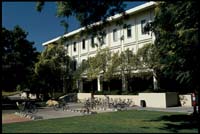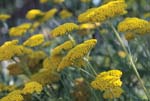COMING SOON: THE HISTORY OF UC DAVIS
 |

Cheesemaking in the 1930s
|
The story of the campus's nearly 100 years has been recounted in the first book-length narrative history of UC Davis, which will soon be available.
"If all goes well," said Professor Emeritus Richard Gable, "we hope to have books available in the UC Davis Bookstore by Christmas." Abundant Harvest: The History of the University of California, Davis, consisting of approximately 400 pages and including more than 250 pictures and a set of reference appendices, is currently in the production process.
"We will have both hard-cover and paperback books available, with the prices still being worked out," said Gable, chair of the UC Davis History Project. "Any profits after meeting the costs of production will go to Shields Library."
The history project was underwritten by funds raised by the UCD Emeriti and the Staff Retirees associations, which supported the work of Ann Scheuring '76, who wrote the book. Scheuring's long association with the campus has paid off in the book's breadth of coverage and sense of detail.
"Every historical work has to be selective," said Scheuring, "but I hope that most readers of this one will find something to their liking. I tried to set the campus in the broader context of its historical times, but also tried to include a sense of the daily life of the campus, with descriptions of student activities as well as of academic program evolution. Trying to make the book readable as well as inclusive was a real challenge."
Although various efforts to document campus history have been made over the years, the institution has never had a book-length standard reference work. An important feature of this volume is its set of appendices recording aspects of campus history ranging from enrollment figures and departmental narratives to lists of chief administrators and faculty award winners.
The main narrative is divided into three parts. Part I describes the founding of the University Farm via legislation passed in 1905 through its largely agricultural years until World War II. Part II records the major changes that took place on cam-pus in the 1950s and 1960s, as the University of California adapted to population growth and new needs for academic and professional education. Part III covers the years from 1970 to 2000, describing campus expansion, efforts to diversify and other events and trends important to the campus's development as a nationally recognized research university.
"We're calling this a centennial record for UC Davis," said Scheuring. "We hope people will find it useful."

NAMESAKES: BAINER HALL
In 1961, after the Bay of Pigs invasion when approximately 1,200 prisoners were held hostage in Cuba, Fidel Castro offered a trade with the United States: He would release most of the captives in exchange for 500 tractors. To negotiate this famous "Tractors for Prisoners" trade, an "unofficial" group of U.S. delegates was sent to Havana—"unofficial" to support the federal government's claim that it hadn't been involved in the invasion. One of those representatives was Roy Bainer, the founder and dean emeritus of UC Davis' College of Engineering and a foremost authority on farm machinery. The small committee faced opposition at home from Americans who objected to the mission, including one who attempted a citizen's arrest, but Bainer and two other professors nevertheless traveled to Havana. There they were whisked to a luxury hotel, which had obviously been bugged, and then taken to speak with a small group of the prisoners. Later they met twice with Castro, whom Bainer found "highly intelligent" and "respectful of professors" but also prone to wander off the subject and determined to get bigger tractors—the kind used for building rather than farming. Hoping for more concessions than the small unofficial delegation could offer, Castro eventually grumbled that the men had no power, bringing the negotiations to an unsuccessful close.

GET GROWING
The UC Davis Arboretum has taken a step into the Davis community with a new demonstration garden created next to Borders Books in the Davis Commons.
Designed with education in mind, the garden consists of flowers, shrubs, grasses and trees that flourish amidst Davis' challenging growing conditions: hot, dry summers, windy days, clay soil and alkaline water. The patio-style garden features dozens of low-input, low-maintenance plants appropriate for the Central Valley: meandering beds of hardy plants geared to new gardeners, California natives for those with greener thumbs and tall decorative grasses for those looking for the latest in garden design.
"It is the first garden in the arboretum to be designed completely with the visitor's learning in mind," said UC Davis Arboretum Director Kathleen Socolofsky.
The garden, called Arboretum Terrace, was developed jointly by the campus arboretum and the UC Davis Grounds Division with funding support from several private donors and groups. Hundreds of community and campus volunteers helped with the planting.
The garden is open 8 a.m. to 8 p.m. daily at the corner of First and E streets.
IN MEMORIAM
Robert Cello, 79, professor emeritus of the School of Veterinary Medicine, died in May of complications from leukemia. A veterinary ophthalmologist, Dr. Cello had also served as director of the Veterinary Medical Teaching Hospital, chair of the Academic Senate and vice chancellor of academic affairs.
Loring Chapman, professor emeritus of psychiatry and human physiology in the School of Medicine, died in May at age 71. Former chair of the Department of Behavioral Biology and director of the Pain Unit at the UC Davis Medical Center, Dr. Chapman was well known for his research on the brain and central nervous system.
Coby Lorenzen Jr., professor emeritus of agricultural engineering, died in July at age 95. A former chair of the Department of Agricultural Engineering, Professor Lorenzen was involved in the development of number of projects, including a grain drier, tractor safety structures and several mechanical harvesters--most notably the tomato harvester--resulting in 20 U.S. patents for the university.
Bor Luh, 85, retired lecturer in food science and technology, died in June while visiting Hawaii. Dr. Luh's work as a food scientist had a substantial impact internationally in food processing, nutrition and food availability.
Donald "Monty" Reynolds, one of the founders of microbiology at UC Davis, died in July at age 82. Over three decades on campus, Dr. Reynolds conducted research on antibiotics and expanded instruction in bacteriology and microbiology. He also started Hammerskjöld House, a student residency program that aims to broaden awareness of international issues and promote cultural exchanges.
Delbert True, professor emeritus of anthropology, died in June at age 77. Dr. True, a specialist in the prehistory of western North America and the southern Andes of South America, joined UC Davis in 1965 and served as the chair of the department.

|

